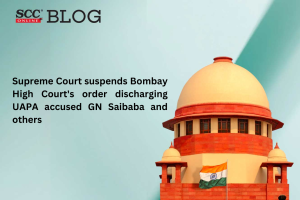Supreme Court: The bench of MR Shah and bela M. Trivedi, JJ assembled on Saturday to hear the appeal against the Bombay High Court’s verdict discharging former Delhi University Professor GN Saibaba, along with 5 others, who was convicted by Trial Court under Sections 13, 18, 20, 38 and 39 of Unlawful Activities (Prevention) Act, 1967 read with Section 120-B of the IPC. The Court has suspended the Bombay High Court judgment till further order.
Bombay High Court’s order
The accused was discharged by the High Court on the ground that, at the time of taking cognizance and/or framing the charge, there was no sanction to prosecute him at all.
State’s Submissions
Looking into the seriousness and gravity of the offences, a detailed scrutiny is required as the High Court has not at all dealt with and/or considered anything on merits.
Further, the application filed by the accused in question to suspend the sentence under Section 389 Cr.P.C. was specifically rejected by the High Court in the year 2020 including on the medical ground.
Accused’s submissions
The accused is 55 years old; he was a professor in the University; he has a family staying in Delhi; his medical condition is such that he is required to be released on bail; that he is on wheel-chair.
On 04.04.2016, the Supreme Court had specifically observed that a case is made out for bail considering his medical condition. Hence, he may be released on bail on any condition that may be imposed by the Court looking to his medical condition.
Supreme Court’s order
The Court thought that this was a fit case to exercise powers under Section 390 Cr.P.C. and to suspend the impugned judgment and order passed by the High Court for the following reasons:
- The accused are convicted for the offences punishable under Sections 13, 18, 20, 38 and 39 of Unlawful Activities (Prevention) Act, 1967 read with Section 120-B of the IPC by the trial Court, after detailed analysis of the evidences on record and on re-appreciation of the entire evidences on record;
- The offences for which the accused were convicted by the trial Court are very serious and if ultimately they are tested by the High Court on merits and on merits the State succeeds and the judgment and order passed by the learned trial Court is upheld, the offences are very serious against the sovereignty and integrity of the country;
- The High Court has not at all dealt with and considered anything on the merits of the judgment and order passed by the trial Court;
- The High Court has discharged the accused Nos. 1-5 only on the ground that the sanction was invalid, mainly on the ground that some material which was placed before the appropriate authority at the time of sanction/review were placed were available on the very day and that no reasons are given while granting sanction. The same is required to be considered in detail considering provision of Section 465 Cr.P.C. So far as GN Saibaba is concerned, he has been discharged on the ground that there was no sanction the day on which the learned trial Court took cognizance and even famed the charge. However, the same question is required to be considered in detail.
On the question of releasing the accused on bail on medical ground, the Supreme Court took note of Bombay High Court’s order dated 28.07.2020 wherein the bail plea was dismissed/rejected by a detailed order as except for narrating the ailments said to be suffered by him, no further details were given. It was also noted that appropriate medical aid was being provided to him.
Hence, the Supreme Court was of the firm opinion that the impugned judgment and order passed by the High Court was required to be suspended.
[State of Maharashtra v. Mahesh Kariman Tirki, 2022 SCC OnLine SC 1430, order dated 15.10.2022]
For State: SG Tushar Mehta,
For GN Saibaba: Senior Advocate R. Basant

